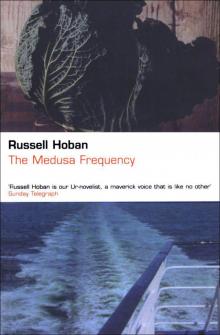Read Medusa Frequency Storyline:
An inexplicable message flashed onto the screen of his Apple II computer at 3 a.m. heralds the beginning of a startling quest for frustrated author Herman Orff. Taking up the offer of a cure for writer's block leads him 'to those places in your head that you can't get to on your own' - and plunges him into a semi-dreamland inhabited by a bizarre combination of characters from myth and reality: the talking head of Orpheus; a lost love; the young girl of Vermeer's famous portrait - and a frequency of Medusas.From Publishers WeeklyAgain demonstrating the versatility and creative energy exhibited in Riddley Walker and Pilgermann, in this slim novel Hoban deals with existential questions: the mystery of existence, the nature of reality, the role of art. Combining satire and fantasy, and in poetic, Joycean language mixed with the vernacular, this narrative rewards the discerning reader. Herman Orff, a failed novelist who supports himself by doing cartoons for Classic Comics, is accosted by the blind head of Orpheus, his progenitor, "the first of your line." Through a series of metaphysical communications that lead to an odyssey through London and Amsterdam, Orff is gradually given to understand the connection between the women in his life: his lost love Luise von Himmelbett (symbolizing Eurydice); the nubile and very available Melanie Falsepercy (symbolizing Persephone); the print of Vermeer's Head of a Young Girl that hangs above his desk and haunts his imagination; and the head of Medusa in a painting by the Dutch master Frans Post: all represent "femaleness." Spare and witty, full of metaphorical, mythical and mystical allusions, the narrative sings with insights. At the same time whimsical, farcical (an advertising agency is called Slithe and Tovey) and deadly serious, it brilliantly relates the tragic ancient myths to the commonplace tragedies of modern life in a violent, dislocated age. Copyright 1987 Reed Business Information, Inc. From Library JournalWhen his creative juices dry up, writer Herman Orff abandons serious novels for comic books. In despair, he tries an acquaintance's electronic device for brain galvanizing and is rewarded by several strange visions of the head of Orpheus, with whom Orff and other characters in the novel are obsessed. Orff's conversations with the head give him a clear understanding of his past and of what being human is, demonstrating the true import of the book: how art acts on and makes sense of experience, which can be fully perceived only whenlike Eurydiceit is lost entirely. An interesting but mannered retelling of the Orpheus myth. Laurence Hull, Cannon Memorial Lib., Concord, N.C.Copyright 1987 Reed Business Information, Inc.Pages of Medusa Frequency :
